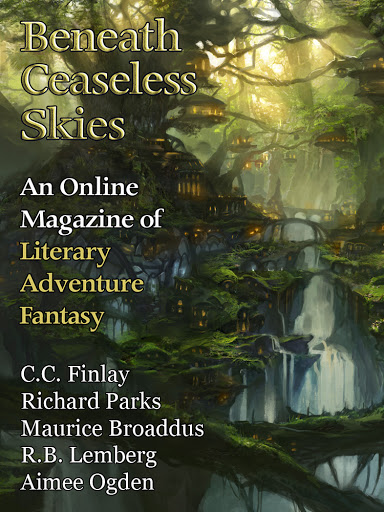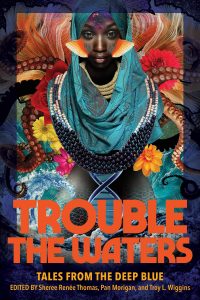Karen Burnham Reviews Short Fiction: BCS, Clarkesworld, and Tor.com
 Beneath Ceaseless Skies 3/26/20
Beneath Ceaseless Skies 3/26/20
Clarkesworld 4/20
Tor.com 4/8/20, 4/22/20, 4/28/20
Beneath Ceaseless Skies has had a heck of spring. After a pair of double issues for their biennial science fantasy run, they wrapped up March with a major milestone, issue #300. This is another oversized collection, including two bonus novelettes and a bonus novella. My favorite story of the issue was the first, ”The Hummingbird Temple” by C.C. Finlay, which continues the adventures of characters Kuikin and Vertier. The focus, though, is on Lin, a motherless child of the ruling Dynast – ninth in line for the throne and mostly left alone to construct a gorgeously elaborate temple model made from hummingbird bones. On the night of the story, her temple is completed, but her father dies, setting off an immediate bloodbath for succession. She is focused solely on survival, escaping with a maid, when her story intersects with Kuikin and Vertir, who are also angling for advantage. They help each other out, and by the end of the night everyone’s fortunes have changed. The story is improbable but engaging throughout – lots of fun to read.
Maurice Broaddus‘s novella ”Bound by Sorrow” is impressive on many levels. It is an extended meditation on grief, expressed in many layers of nested stories. The primary through line follows Dinga and Gerard as they venture to find the city of the gods where the orisha live. Dinga seeks to lay the bones of his half-sister Lalyani to rest there, but he must also confront his history with his father and with the gods themselves. Gerard, a Greek, is more-or-less along for the ride but serves as an interesting contrast for storytelling that is deeply rooted in West African tradition. The grief of the refugee and immigrant permeates ”To Balance the Weight of Khalem” by R.B. Lemberg. A beautiful story, it focuses on a refugee from war-torn Raiga to the floating city of Khalem. Allowed in partly on student papers but also to act as human ballast, the narrator hopes to eventually get to Islingar. When war reaches Khalem, they are able to secure a student position in Islingar, and they leave the floating city with almost nothing but their papers and a carved onion that represents the city. Their journey leads to transformations on many levels, as the narrator meets a shapeshifting lover and speaks to one who is even more bound to Khalem, although they can never return. The themes of gender identity and immigration are natural to Lemberg, and their skill as a writer of both prose and poetry makes the imagery of their stories particularly memorable.
Finally, Aimee Ogden‘s story ”Never a Butterfly, Nor a Moth with Moon-Painted Wings” imagines the process of assimilation when you’re a refugee in your own lands. The narrator of the story is one of the People of the Butterfly, a nomadic people who are forced to take refuge in Ksmala. They’re forced to assimilate on multiple levels: with the economy, with their labor, giving up their culture and paying heed to the dominant religion. The story is told as a letter embroidered on cloth to a daughter who may never receive it. The daughter grew up after the resettlement, speaking Ksmala more fluently than her mother’s language. Eventually she leaves to make her own way in the world, following a path of her own making. The love and sorrow of the story shine through beautifully.
April’s Clarkesworld has an amazing range of stories from a number of different perspectives. ”Distant Stars” by P.H. Lee imagines a researcher who at first seems to be a failure both at physics and at parenting, eventually losing custody of her child to her ex-wife. But her abstruse thinking on rotational frames of reference eventually leads to a Nobel Prize, and her son becomes an astronaut who might be able to help test her theories. In the vein of Ted Chiang’s ”Story of Your Life”, this story seeks to pair high-level science with an intimately personal story. ”AirBody” by Sameem Siddiqui would fit nicely in this year’s Avatars Inc anthology (about which more later). Meena, an Urdu-speaking auntie, rents time in a young man’s body, and they’re able to converse at some level while she cooks in his New York apartment. For him it’s a way to make extra money on the weekends, but her goal in buying his time also reminds him of a particular relationship from his past. I loved the main story and the exchange across geography, generation, and gender, although I didn’t feel like Meena’s story and the host’s backstory meshed perfectly.
”A System for Investigating Recapitulation and Evolutionary Novelty” by Kyle E Miller imagines a world where everyone exists on their own Leaf, and they interact with others only virtually. L is getting over a breakup with J and fending off unsolicited dick pics (a problem even in this carefully controlled society), when she hears a song that she can’t ignore, one that eventually drives her to try to destroy her Leaf and just maybe learn more about the underlying construction of her world system. ”The ThoughtBox” by Tlotlo Tsamaase features a woman, Ogone, in a classically abusive relationship – giving everything to her demanding and controlling boyfriend who gives nothing back. His efforts at control extend to installing a ThoughtBox that can read their digital implants to divine their thoughts and, supposedly, share them with each other. When a friend finally convinces her that he might truly be scamming her, she goes looking for some of his deleted memories – uncovering a plot so convoluted that it stretches credulity. I found the portrait of the relationship and Ogone’s perspective on it to be harrowing enough and, even if I didn’t totally buy into the reveal, I was rooting for her.
”Debtless” is a long novelette from Chen Qiufan (translated by Blake Stone-Banks), imagining Square Face, a space miner whose debt peonage is encoded via blockchain into his very genome. His line of work doesn’t come with a very high life expectancy, and he sees multiple coworkers die on the job, all with the refrain: ”The debt is paid, Death is just the middleman.” Eventually, between the horrors he sees and the memories that seem to be leaking past the mind-wipes he believes he agreed to when he left Earth, he stages a protest. Surviving the harrowing event of being thrown off the station, he makes an even more disturbing discovery about what exactly is going on with his very closed society. I love the way the story follows through on the consequences of the hero’s revelations, taking the story into much deeper and trickier territory.
My favorite of the Tor.com stories that I read in April is ”Little Free Library” by Naomi Kritzer. Meigan moves to St. Paul MN and sets up the eponymous Little Free Library, a small book-swapping station. She’s hoping to offload some extra books from her library and get to know her neighbors – and she does when one person starts taking books and leaving strange small gifts, and eventually notes, in return. Meigan finds herself reading dispatches of a conflict beyond her ken – is it something truly fae, or a mundane neighbor with a particularly creative streak? The story is delightfully charming. Another example of crossovers between worlds is ”Of Roses and Kings” by Melissa Marr. I don’t think it’s giving too much away to say that this story imagines Alice taking the role of the Red Queen in a warped version of the already warped Wonderland. Rose is a new character thrown in jail for killing the Red King, who was continually threatening Alice/the Queen. Alice and Rose, two of the rare humans in Wonderland, have developed an intensely erotic relationship, but madness is around every corner. Fran Wilde‘s ”An Explorer’s Cartography of Already Settled Lands” imagines a more elegiac mixing of worlds. The Navigator had been part of a Ship that crossed vast distances to settle on foreign shores, but they find the place inhabited. With limited options, the Navigator volunteers to explore, to see if there are voids on the map or in society where their people can fit in or hide. The Navigator’s identity shifts as they learn more and more about the places and people they visit, so when they and their family find themselves refugees during a time of war it is with an extra layer of estrangement that they seek to once more find their Ship and its Captain.
Recommended Stories
”Bound by Sorrow”, Maurice Broaddus (Beneath Ceaseless Skies 3/26/20)
”Debtless”, Chen Qiufan (Clarkesworld 4/20)
”The Hummingbird Temple”, C.C. Finlay (Beneath Ceaseless Skies 3/26/20)
”Little Free Library”, Naomi Kritzer (Tor.com 4/8/20)
”Never a Butterfly, Nor a Moth with Moon-Painted Wings”, Aimee Ogden (Beneath Ceaseless Skies 3/26/20)
Karen Burnham is an electromagnetics engineer by way of vocation, and a book reviewer/critic by way of avocation. She has worked on NASA projects including the Dream Chaser spacecraft and currently works in the automotive industry in Michigan. She has reviewed for venues such as Locus Magazine, NYRSF, Strange Horizons, SFSignal.com, and Cascadia Subduction Zone. She has produced podcasts for Locusmag.com and SFSignal.com, especially SF Crossing the Gulf with Karen Lord. Her book on Greg Egan came out from University of Illinois Press in 2014, and she has twice been nominated in the Best Non Fiction category of the British SF Awards.
This review and more like it in the June 2020 issue of Locus.
 While you are here, please take a moment to support Locus with a one-time or recurring donation. We rely on reader donations to keep the magazine and site going, and would like to keep the site paywall free, but WE NEED YOUR FINANCIAL SUPPORT to continue quality coverage of the science fiction and fantasy field.
While you are here, please take a moment to support Locus with a one-time or recurring donation. We rely on reader donations to keep the magazine and site going, and would like to keep the site paywall free, but WE NEED YOUR FINANCIAL SUPPORT to continue quality coverage of the science fiction and fantasy field.







